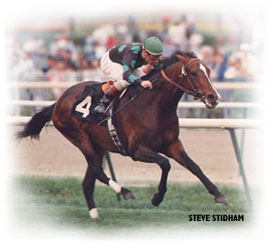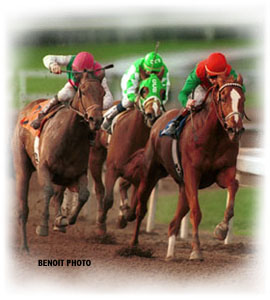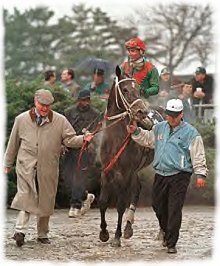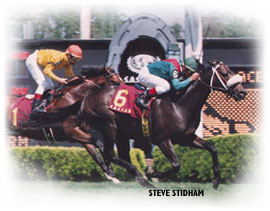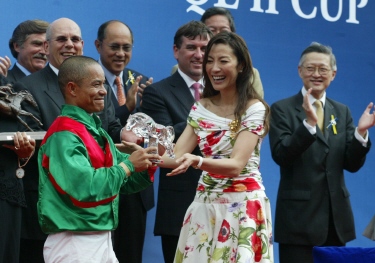
|
Team Valor’s success with syndicated horses begins with selection. What separates these equine prospectors from their rivals is an ability to spot talent before it rises to the surface. From inception, it was decided to place the primary emphasis on talent. This flew in the face of the conventional wisdom used by Team Valor’s competitors and traditionalists, who focused first on pedigree. "We had limited funds in the beginning," said Barry Irwin, "and we wanted to get the most horse for the dollars spent. So we put talent first. We also relegated pedigree even farther down the list. "Second to talent, we placed athleticism. Next came soundness, followed by temperament. Pedigree became our last consideration. We wanted to get the most bang for our buck and pedigree costs money, money that most times is never returned to the investor." Over the years, the syndicates produced top runner after top runner, most of which had pedigrees that were unrecognizable. Political Ambition, the pair’s initial syndicated runner, is a case in point and illustrates the type of animal that would come to typify an Irwin/Siegel runner. Bought as an unraced colt at the beginning of his 3-year-old season from Kentucky Governor Brereton C. Jones, the colt attracted the pair’s attention because of the manner in which he breezed at Santa Anita. He did not work particularly fast, but he looked brilliant in motion.
Twenty years later, Team Valor is still pulling rabbits out of a hat. Consider the case of Cashier’s Dream, who sent even veteran breeders and researchers to their books to find out something about her sire, the unheralded Service Stripe. They could be forgiven their ignorance, as Cashier’s Dream was, after all, the first horse ever bred in the state of Michigan to win a Grade 1 race. In 2006, Irwin spent $16,700 at the National Yearling Sale for a filly in South Africa by a stallion whose stud fee was less than $500. The following season at 2, she won 2 of her first 3 starts, including the Grade 3 Strelitzia Stakes. The stable over the years has won major North American races with horses selected as yearlings, unraced 2-year-olds and lightly-raced stock. Horsemen and fans alike have marveled at Team Valor’s ability to uncover new stars year after year and wonder how Team Valor does it. "There are no tricks to the trade," said Irwin. "It’s just a matter of skill developed over a long period of time through trial and error. "I once asked an old horseman, a guy famous for picking out champions, how he did it. Here is what he told me. ‘You know, I play a lot of gin rummy. I have played against a lot of sharp players, some of the best in the world, I’d say. Well, I won more than I lost, a lot more. But I only won by a little bit. I was just a little bit better than the other guys. You only have to be a little bit better to win." Playing with a short bankroll against the heaviest hitters on the planet, Team Valor has used the full range of its poker-playing skills over the years to stay one jump ahead of the competition.
Team Valor has been able to develop top racehorses because of reasons as follows:
Type In order to be able to recognize "type," one must possess an understanding of physical characteristics as it relates to the pedigree of the horse. "The pedigree of a horse," said Barry Irwin, "is not just a piece of paper, it is a cataloguing of ancestors that each had their own ‘type’ and, in some way, passed it on to the next generation. "Figuring out ‘type’ can be very confusing, because in many instances it is not readily apparent from looking at a horse or its pedigree which ancestor or ancestors it will ultimately most closely mirror." The stable over the years has etched its name into the history of the Turf by being able to determine ‘type’ that was not readily apparent. When Prized won the Breeders’ Cup Turf he became the first and only horse ever to win that $2-million race without a previous start on grass. His sire, Kris S., had never run on the grass and had yet to be recognized as the leading grass sire he would become. Martial Law had raced solely on grass in England for Sheik Mohammed. His sire, Mr. Leader, had been a multiple stakes winner on grass in America. But he was bought for $60,000, imported specifically with dirt racing in mind and, in the colt’s third start in America, won the $1-million Santa Anita Handicap. The stable recognized Mr. Leader was a substandard grass sire and capitalized on this understanding of 'type.'
When Team Valor delivers a new horse to its trainer, it explains to the horseman why it decided to add the horse to its stable, what its goals are for that animal and how it thinks the horse should be handled in order to reach that goal. During the career of the horse, especially in the beginning, Team Valor constantly works with its trainers in fine-tuning the developmental process of the animal, in order to make sure that its vision of how the horse should develop is being met. "When we buy a horse," said Irwin, "we have a vision of what it can achieve. Most of the trainers we have worked with have respect for our opinion and have seen us transform enough horses over the years from no-names to Graded stakes winners that they readily accept our input. "Horses of ours are hand picked and placed well, so they rarely get lost in the shuffle." Coach Irwin undoubtedly would have been a coach had it not been for a passion for horse racing. The same skills and understanding Irwin would have used to coach human athletes in track and field have been transferred to the equine arena. "I can see myself having been a
college track coach," said Irwin. "And what I would have done
as a coach--prospecting kids from the inner city, developing their
bodies and temperaments at a university--is what I am doing now with
horses." Team Valor is respected as much for its placement of horses as it is for its selection and development of racehorses. As good as Team Valor’s general statistics are, its stats are even better in stakes races. The key to compiling stats as impressive as these is Team Valor’s placement of its runners. "We run to win," said Barry Irwin. "The reason we have such a fantastic record is that we are completely realistic in the evaluation and placement of our runners.
"In order to compile a racing record like ours, one has to be intimately familiar with the competition and have the ability to honestly assess one’s own horse. We try to be as brutally frank with ourselves as is humanly possible. We try to take emotion out of the equation when we decide where to place our horses." Irwin emphasized that Team Valor’s record is extra impressive because "we don’t run in the minor leagues and we race horses at the highest level. In the last few years, we have run only one horse in a claiming race." Over the years, racing enthusiasts have learned not to second guess Team Valor when it runs a horse that on paper does not appear to belong. When Martial Law was entered for the Grade 1 Santa Anita Handicap, bettors and the press corps thought it was crazy to put a 50-to-1 shot in the million-dollar winter classic, especially since the owners had to pony up $40,000 in supplementary and entry fees. But he proved he belonged by not only winning for a $103.60 mutuel for a $2-bet, but his final time has been bettered in the history of the race only by Affirmed. When Team Valor paid $50,000 to supplement the English colt My Memoirs for the Belmont Stakes even though he had never run on dirt or won a Graded stakes, skeptics scoffed once again, yet the 18-to-1 longshot came within three-quarters of a length of running down Horse of the Year A. P. Indy to finish second in the Triple Crown race. Perhaps most famously, Team Valor won the Kentucky Derby with their home-bred colt Animal Kingdom, in just his fifth lifetime start, and his first-ever race on a dirt track. There have been countless other important scores by horses that seemingly did not belong:
Team Valor horses always get bet. They get bet because they are live as live can be.
Consider since 1987 with over 650 runners the significance of the following:
|
|||||
| RETURN TO TOP OF PAGE |

